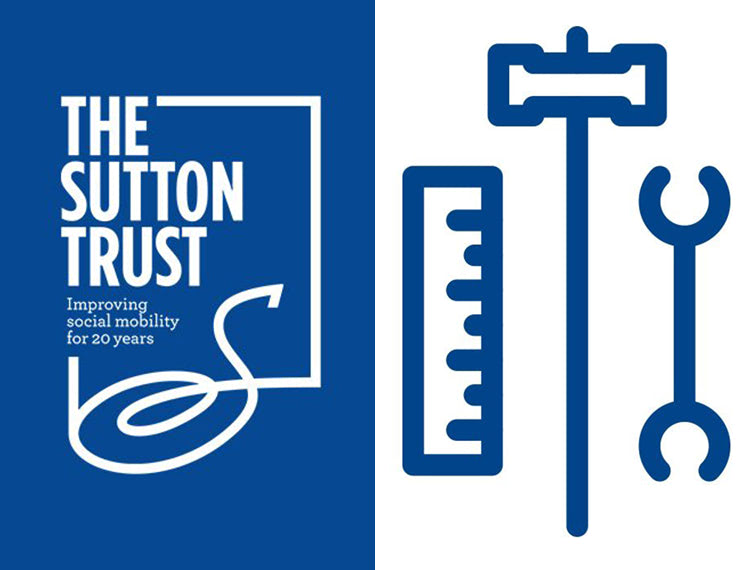TEACHERS STILL UNLIKELY TO RECOMMEND APPRENTICESHIPS, DESPITE ONLY 25% OF YOUNG PEOPLE UNINTERESTED

NEW SUTTON TRUST POLLING ON ATTITUDES TOWARDS APPRENTICESHIPS.
AROUND TWO-THIRDS OF YOUNG PEOPLE ARE INTERESTED IN APPRENTICESHIPS, BUT TEACHERS STILL UNLIKELY TO ADVISE THEIR PUPILS TO OPT FOR ONE.
A growing proportion of young people are interested in starting an apprenticeship rather than going to university, but teachers are still unlikely to advise their high-attaining students to take this route. This is according to new polling of teachers and young people published by the Sutton Trust today ahead of a major summit on apprenticeships.
2,381 11 – 16 year olds in academies and maintained schools in England and Wales were surveyed by Ipsos MORI about their attitudes to apprenticeships. Around two-thirds (64%) said they would be very or fairly interested in starting an apprenticeship available for a job they wanted to do instead of going to university, a rise of nine percentage points from 2014 when 55% of young people said they were interested in this route. A quarter (25%) of those polled this year said they were not very or not at all interested in starting an apprenticeship
Previous research by the Sutton Trust found that the best apprentices – those with a level 5 qualification or higher – will earn £50,000 more in their lifetime than someone with an undergraduate degree from a university outside of the Russell Group.
Today’s polling highlights a disconnect between young people’s interest in apprenticeships and the advice they’re offered at school. 40% of the young people surveyed said their teachers had never discussed the idea of apprenticeships with them. However the proportion saying they had discussed apprenticeships with their teacher is improving, up from 31% in 2014 to 41% this year.
Separate polling of 1,246 teachers (of which 583 were secondary teachers) by the National Foundation for Educational Research (NFER) found that just a fifth (21%) would advise a high performing student to opt for an apprenticeship, though this is up from 13% in 2014. Almost two-thirds (64%) of the 583 teachers surveyed said they would rarely or never advise students with good grades to take this route.
Of those unlikely to advise their students to start an apprenticeship, over a third (36%) said it was down to a lack of information about apprenticeships in general and in relation to the options available to their students. Just over a quarter (28%) thought their students had better career prospects at university, while 14% cited negative views about the quality of apprenticeships on offer.
This new polling is published ahead of today’s major summit the Sutton Trust is hosting on apprenticeships. The event – which is part of the Trust’s campaign to make sure there are good-quality apprenticeships available for young people of all backgrounds – will include remarks by Anne Milton MP, Skills Minister and Robert Halfon MP, Chair of the Education Select Committee and Gordon Marsden MP, Shadow Skills Minister. The event will also feature an apprentice panel chaired by Gillian Keegan MP.
Sir Peter Lampl, Founder of the Sutton Trust and Chairman of the Education Endowment Foundation, said:
“The best apprenticeships offer young people outstanding career prospects and financial rewards. So it is good to see that a growing proportion see them as offering genuine alternatives to A-levels and degrees. However we need to do much more to make sure teachers advise their students to opt for apprenticeships. This includes dispelling their view that apprenticeships are not of high quality and also giving teachers access to the information they need.”
The Sutton Trust’s Better Apprenticeships campaign is calling for all apprenticeships to be of high quality, with seamless career progression. There should also be a focus on creating more higher and degree level apprenticeships to offer suitable alternatives for those who do not wish to go to university.
To harness apprenticeships as a driver of social mobility, the Sutton Trust is calling on the government to focus on creating better apprenticeships, accessible to all. The Institute for Apprenticeships and the apprenticeship levy should have a widening access function to ensure access to advanced and higher apprenticeships for those from less advantaged backgrounds. There should be a stronger drive from the government to support and encourage young people to take them up.
Careers advice should more strongly take into account the benefits of apprenticeships as a route to career and educational progression. Gender segregation should also be tackled through better careers advice.
The full polling will be available here. The summit will be live streamed on the Sutton Trust’s Twitter and Facebook.
About The Sutton Trust: A foundation set up in 1997, dedicated to improving social mobility through education. It has published over 200 research studies and funded and evaluated programmes that have helped hundreds of thousands of young people of all ages, from early years through to access to the professions.
The NFER runs Teacher Voice omnibus surveys three times a year, in the autumn, spring and summer terms. The survey achieves responses from over 1,000 practising teachers from schools in the maintained sector in England. The panel is representative of teachers from the full range of roles in primary and secondary schools, from head teachers to newly qualified class teachers.
Ipsos MORI interviewed 2,381 school children aged 11-16 in schools in England and Wales. Pupils were selected from a random sample of schools, and self-completion questionnaires were completed at school and online between February and May 2018. Data are weighted by school year, gender and region to match the profile of school children across England and Wales.











Responses